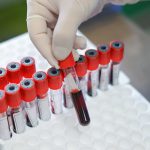Treatment
-
Policy Matters
Toward Improved Dosing in the Precision Oncology EraA forthcoming article series outlines considerations for the dose optimization of modern oncology drugs.
by Brad Davidson, PhD
-
Overcoming Resistance
People with metastatic hormone receptor-positive breast cancer are living longer, thanks to new targeted therapies and endocrine therapies that can be prescribed when treatment resistance develops.
by Kendall K. Morgan
-
Liquid Biopsies: A Fast, Accurate Alternative
Blood tests can guide treatment choices, delivering results in less time than traditional biopsies.
by Stephen Ornes
-
Treating HER2-ultralow Breast Cancer
FDA approval expands treatment options for people with metastatic breast cancer that expresses minimal levels of HER2.
by Sandra Gordon
-
Injection Immunotherapies Get FDA Approval
Giving immunotherapy drugs as injections, rather than intravenously, means patients can spend less time in the hospital or treatment center.
by Laura Gesualdi-Gilmore
-
Treating Smoldering Multiple Myeloma
A monoclonal antibody drug reduced the risk of smoldering myeloma progressing to multiple myeloma in patients at high risk for disease progression.
by Sandra Gordon
-
Immunotherapy Improves Survival in Bladder Cancer
New research indicates that adding immunotherapy to muscle-invasive bladder cancer treatment can improve event-free and overall survival.
by Laura Gesualdi-Gilmore
-
Delaying Treatment Resistance
Adding a CDK 4/6 inhibitor extends progression-free survival for people with metastatic HR-positive, HER2-positive breast cancer.
by Thomas Celona
-
2024: The Year in Cancer News
The Cancer Today editors share the most impactful reporting on cancer research from 2024.
by Cancer Today staff
-
Forward Look
Stem Cell Transplant Rates Decrease for LymphomaMore patients are receiving CAR T-cell therapy for large B-cell lymphoma.
by Leah Lawrence














